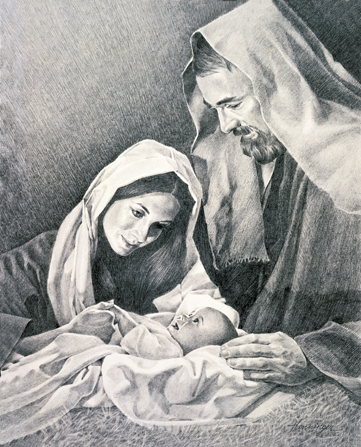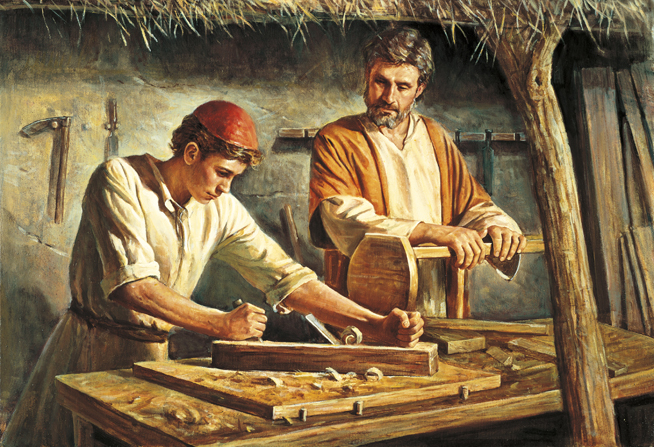I’m a sucker for a good Christmas story, and I suppose I have my mother to blame thank for that. Mom was a great story teller, and on Christmas Eve, we’d gather around the fireplace in the living room, and she would tell us another Christmas story – The Other Wise Man, The Little Match Girl, The German Christmas Apple, and more. Those stories not only tug at my heartstrings because of the stories, but also because of the memories they invoke.
My love for Christmas music may well also be genetic. My mother used to tell me her father would whistle Silent Night all year long. I enjoy the secular as well as religious songs. I’m as happy to sing Silver Bells as Hark, The Herald Angel Sing (though I’m happy to leave those novelty songs behind: I don’t really want a hippopotamus for Christmas, and my Grandma did not get run over by a reindeer, thank you very much).

I like to think the Christmas traditions from our home will also rub off on our kids – our annual cookie baking and giving, our Christmas Eve Swedish Smorgasbord and retelling of the birth of the Savior, our singing and playing of carols. I know my boys especially have gone through phases where many of those traditions have seemed less important (though they’ve always been happy to eat), but I hope that as they grow and have families of their own they’ll find some comfort in the traditions of their childhood, just as I do.
My anxieties around Christmas (and I have plenty) are all connected to my fatherhood. I still do not sleep well on Christmas Eve, but not because I wonder what Santa might bring me; I worry that one of my children might not be thrilled with what Santa brings her. (Thankfully, none of my children has ever grimaced at me after opening the Santa gift with the “what were you thinking” look that they are capable of; I assume that’s their mother’s good influence at work.) And I worry that the things that are most special to me at this time of year may not be special to them, namely the celebration of the birth of our Savior and what that means.
Jeffrey R. Holland, before he served in the presiding councils of the church, spoke to religion faculty at BYU and spoke tenderly of his lessons of fatherhood, and what they taught him about Joseph:
As a father I have recently begun to think more often of Joseph, that strong, silent, almost unknown man who must have been more worthy than any other mortal man to be the guiding foster father of the living Son of God. It was Joseph selected from among all men who would teach Jesus to work. It was Joseph who taught him the books of the law. It was Joseph who, in the seclusion of the shop, helped him begin to understand who he was and ultimately what he was to become.
I was a student at BYU just finishing my first year of graduate work when our first child, a son, was born. We were very poor, though not so poor as Joseph and Mary. My wife and I were both going to school, both holding jobs, and in addition worked as head residents in an off-campus apartment complex to help defray our rent. We drove a little Volkswagen which had a half-dead battery because we couldn’t afford a new one (Volkswagen or battery).Nevertheless, when I realized that our own night of nights was coming, I believe I would have done any honorable thing in this world, and mortgaged any future I had, to make sure my wife had the clean sheets, the sterile utensils, the attentive nurses, and the skilled doctors who brought forth our firstborn son. If she or that child had needed special care at the Mayo Clinic, I believe I would have ransomed my very life to get it.
I compare those feelings (which I have had with each succeeding child) with what Joseph must have felt as he moved through the streets of a city not his own, with not a friend or kinsman in sight, nor anyone willing to extend a helping hand. In these very last and most painful hours of her “confinement,” Mary had ridden or walked approximately 100 miles from Nazareth in Galilee to Bethlehem in Judea. Surely Joseph must have wept at her silent courage. Now, alone and unnoticed, they had to descend from human company to a stable, a grotto full of animals, there to bring forth the Son of God.
I wonder what emotions Joseph might have had as he cleared away the dung and debris. I wonder if he felt the sting of tears as he hurriedly tried to find the cleanest straw and hold the animals back. I wonder if he wondered: “Could there be a more unhealthy, a more disease-ridden, a more despicable circumstance in which a child could be born? Is this a place fit for a king? Should the mother of the Son of God be asked to enter the valley of the shadow of death in such a foul and unfamiliar place as this? Is it wrong to wish her some comfort? Is it right He should be born here?”
He then continues to praise Mary, herself little more than a child, who alone brought the Savior into the world.

I came across Elder Holland’s words in the early 1980’s as my own family was young, and I was anxious to model my fatherhood after Joseph’s. Joseph did not have means to do everything he might have wished, but he did what he could. He did what he needed to do. I wanted to be like Joseph, to provide guidance to my children, and to get out of the way so that they could each discover their divine potential.
Alas, I am no Joseph. I am an imperfect father and I have imperfect children. We all make good choices some days and not such good ones other days. Some of my children walk in paths I would not have chosen for them. Some of them carry burdens that, while I sympathize, I cannot understand.
But I do have this: I have children who enjoy coming home for Christmas and joining us around the table for a Christmas Eve smorgasbord or a Christmas Day ham dinner, and who, if not completely believing, are at least patient and kind with our displays of faith and hope in the birth of our Savior.
Not all of my children will be home this year, but as their father, I will hold them where I always do, in my heart, wishing them the merriest of Christmases, and the peace that comes from knowing the Savior.
Image credits: openlibrary.org, lds.org
Continue reading at the original source →



